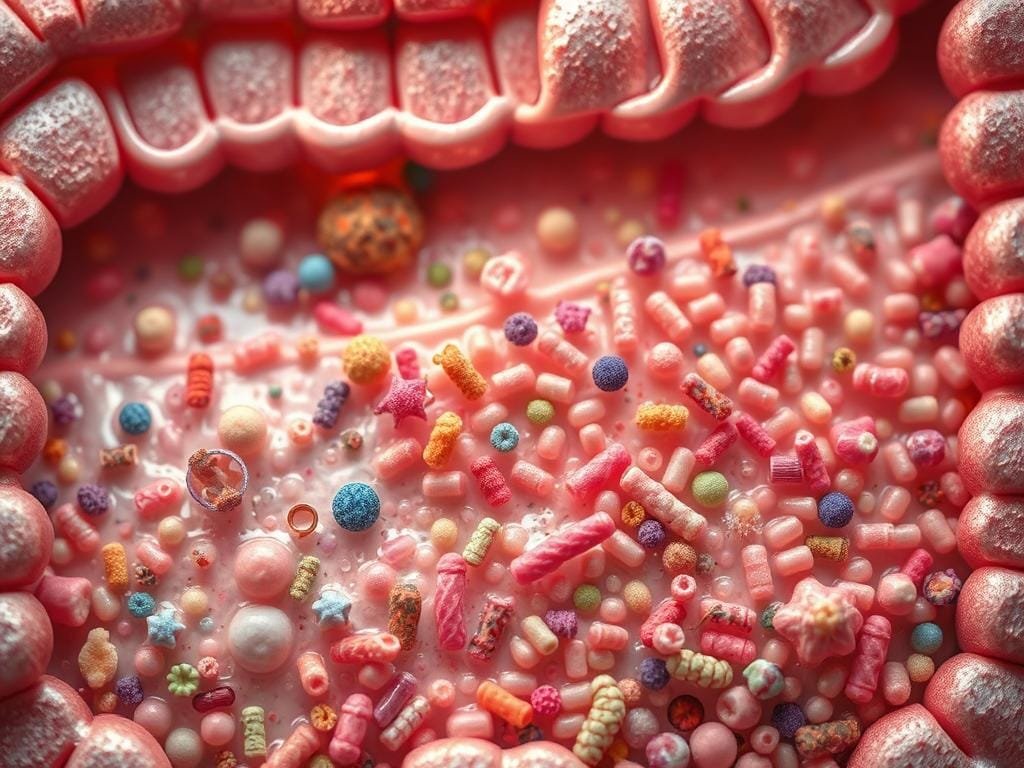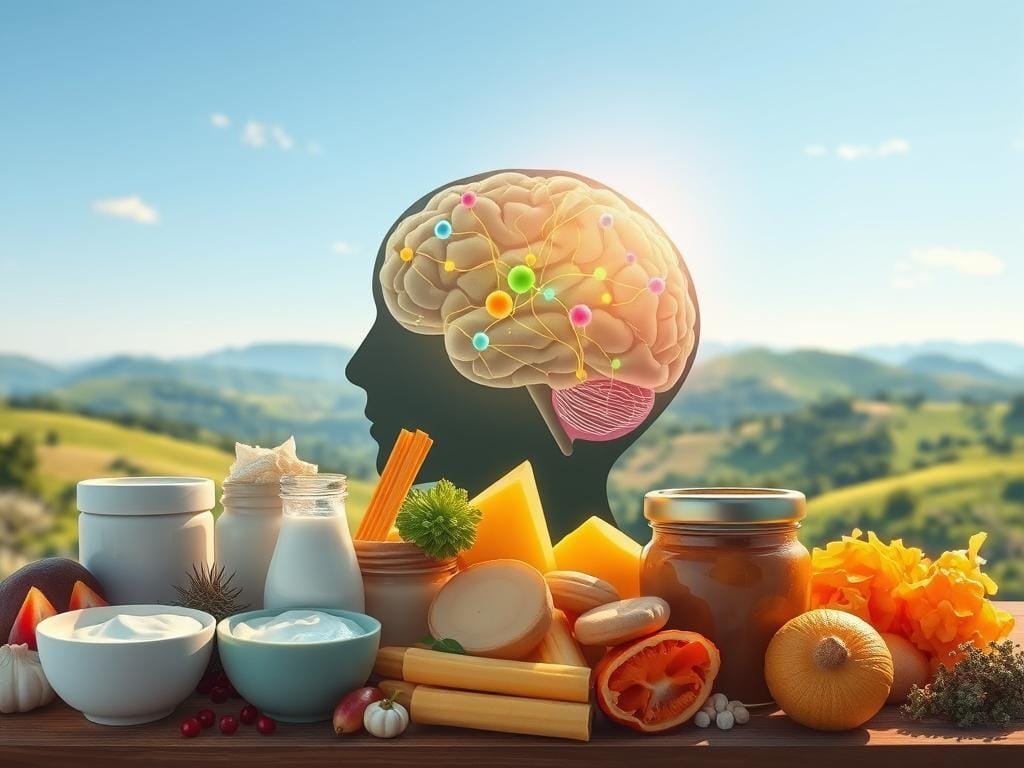Did you know your digestion can really affect your mood? Studies show the gut and brain are closely linked through the gut-brain axis. This network is key to our overall health.
This system lets the brain and gut talk to each other. It affects your mental health and how you feel. Keeping your gut healthy is vital for a good mood and overall health.
Table of Contents
Key Takeaways
- The gut-brain axis is a two-way communication network between the gut and the brain.
- A healthy gut microbiome is important for mental health and well-being.
- Digestive health can greatly impact your mood and emotional state.
- Keeping a balanced gut is essential for overall health.
- The gut-brain connection is vital for emotional control.
Understanding the Gut-Brain Axis
The gut-brain axis is a network that links your gut and brain. It involves the gut microbiome, the enteric nervous system, and the central nervous system. This system is key to your health and wellbeing.
What Is the Gut-Brain Axis?
The gut-brain axis is more than just a simple link. It’s a complex network that lets your gut and brain talk to each other. The vagus nerve is the main way these two communicate.
Key Components of the Gut-Brain Axis
The gut-brain axis has several important parts. These parts work together to keep you healthy. They include:
- The enteric nervous system, or “second brain,” which runs your gut.
- The gut microbiome, with trillions of microbes that affect digestion and health.
- The vagus nerve, which connects your gut and brain.
- The central nervous system, which includes your brain and spinal cord. It handles signals from your gut.
| Component | Function |
|---|---|
| Enteric Nervous System | Controls gastrointestinal tract functions |
| Gut Microbiome | Influences digestion and overall health |
| Vagus Nerve | Facilitates gut-brain communication |
| Central Nervous System | Processes signals from the gut |
To keep your gut-brain axis healthy, eat foods that are good for your gut. Learn more about this in our article on the ideal diet for a healthy lifestyle.
The Role of Gut Microbiota
The trillions of microbes in your gut do more than just live there. They actually affect your mood and how well you think. This complex ecosystem is key to our health, focusing on the gut-brain axis.
What Are Gut Microbes?
Gut microbes, or gut microbiota, are the trillions of microorganisms in your gut. They are mostly bacteria but also include viruses, fungi, and more. They help with digestion, keep the immune system strong, and even make some vitamins.
These microbes make neurotransmitters and hormones that affect your mood and thinking. For example, some bacteria make serotonin, which helps control mood, hunger, and sleep.

How Gut Microbes Impact Mental Health
Research is showing how gut microbes affect mental health. An imbalance in these microbes, or dysbiosis, is linked to anxiety and depression.
- Production of Neurotransmitters: Certain gut bacteria can produce neurotransmitters that influence mood and cognitive functions.
- Inflammation Reduction: Some gut microbes can help reduce inflammation, which is often linked to mental health disorders.
- Gut-Brain Communication: The gut microbiota communicates with the brain through the gut-brain axis, influencing stress response and emotional regulation.
Keeping a healthy balance of gut microbiota is vital for mental health. This can be done with a balanced diet, probiotics, and other lifestyle choices that support gut health.
The Bi-Directional Communication
Your gut and brain talk to each other in a two-way conversation. This complex system lets them share information, affecting your health and happiness.
How the Gut Communicates with the Brain
The gut and brain talk through several ways, with the vagus nerve being key. The vagus nerve is like a superhighway for messages between the gut and brain. It helps control your mental health.
A study found the vagus nerve plays a big role in gut and brain communication in the Journal of.
Other ways, like hormones and neurotransmitters, also help in this conversation. The gut makes neurotransmitters that can change your mood and how you think.
How the Brain Influences Gut Function
The brain also sends messages to the gut, affecting its work. Stress can make the gut uncomfortable. This is because stress changes the gut’s environment and its health.
Knowing how your gut health and brain health are connected is key. Keeping a healthy gut and managing stress helps both your gut and brain. This supports your overall well-being.
The Impact of Diet on the Gut-Brain Axis
Diet plays a big role in how well your gut and brain work together. What you eat affects your digestive health and mood. The food you choose shapes your gut microbiota, which is vital for your health.
Foods That Support Gut Health
Eating foods high in fiber and fermented foods is good for your gut. Foods like fruits, veggies, and whole grains help good bacteria grow. Fermented foods, like yogurt and sauerkraut, add to your gut’s diversity.
Studies show that fiber-rich diets boost good bacteria in your gut (PMID: PMC4367209). Adding these foods to your diet keeps your gut bacteria balanced.
- Fruits and vegetables
- Whole grains
- Yogurt and kefir
- Sauerkraut and other fermented foods

Foods to Avoid for a Healthy Gut
Some foods are bad for your gut. Foods high in saturated fats and sugars harm your gut microbiome. It’s best to avoid foods with lots of processed ingredients, added sugars, and unhealthy fats.
| Foods to Limit | Potential Impact |
|---|---|
| Processed foods | Disrupts gut bacteria balance |
| Foods high in added sugars | Promotes inflammation |
| Foods high in saturated fats | Negatively affects gut health |
Being careful about what you eat helps your gut and brain. A diet full of good foods and low in bad ones keeps your gut-brain axis healthy.
Stress and the Gut-Brain Connection
Stress can really affect your gut health, messing with digestion and mood. When you’re stressed, your body’s response can upset the balance of your gut microbiota. This can lead to many health problems.
The Effects of Stress on Digestion
Stress can slow down digestion, causing bloating, pain, and changes in bowel habits. This is because stress releases hormones like cortisol. These hormones can mess with your digestive system’s normal function.
To deal with stress-related digestive issues, try adding relaxation techniques to your day. For tips on improving digestion naturally, check out our guide on how to improve digestion and boost fat loss.
How Stress Impacts Mood
The gut and brain are linked through the gut-brain axis. Stress can harm this connection, leading to mood disorders like anxiety and depression. When your gut health is off, it can mess with neurotransmitter production. These chemicals are key for mood regulation.
Keeping your gut healthy through a balanced diet and stress management can help. Eat foods high in fiber, drink plenty of water, and try mindfulness or meditation.
The Importance of Probiotics
Probiotics are key to a healthy gut microbiome, which affects your mental health. They help keep your gut healthy, which is good for digestion and immune function. They also play a big role in your mental well-being.
What Are Probiotics?
Probiotics are live microorganisms that are good for your health. They are found in foods like yogurt, kefir, sauerkraut, and kimchi. They are also in dietary supplements. Probiotics help maintain a healthy gut microbiome, which is vital for digestion, immune function, and mental health.
A diverse gut microbiome is essential for health. Probiotics add beneficial bacteria to your gut. This helps fight off bad bacteria, reduces inflammation, and strengthens the gut barrier.
How Probiotics Benefit Your Mental Health
Probiotics do more than just help your gut. They also improve your mental health. Studies show they can ease anxiety and depression symptoms. They do this by affecting the gut-brain axis, a network between your gut and brain.
“The gut-brain axis is a complex communication network that links the enteric nervous system of the gastrointestinal tract to the central nervous system. Probiotics play a critical role in this axis, influencing mood and cognitive functions.”
Probiotics can help your mental health in several ways:
- Reducing inflammation, which is linked to mental health issues
- Making neurotransmitters that affect mood
- Improving the gut barrier function, reducing leaky gut syndrome risk
| Probiotic Strain | Potential Benefits |
|---|---|
| Lactobacillus | Improves digestion, reduces symptoms of anxiety and depression |
| Bifidobacterium | Enhances immune function, improves mood |
| Streptococcus | Supports gut health, may reduce inflammation |
You can add probiotics to your diet by eating fermented foods or taking supplements. But, always talk to a healthcare professional before starting any new supplements.

Understanding the role of probiotics in gut and mental health can help you improve your well-being. It’s a proactive step towards better health.
The Role of Inflammation
Inflammation in the gut is key to mental health. The gut and brain are linked, and inflammation can upset this balance.
Understanding Gut Inflammation
Gut inflammation happens when the gut lining gets irritated. This leads to more permeability and the release of pro-inflammatory cytokines. It can be caused by a bad diet, stress, and some medicines.
A study on the National Institutes of Health website shows gut inflammation’s wide impact on health, including mental health.
The Link Between Inflammation and Anxiety
Research links gut inflammation to anxiety. When the gut is inflamed, it releases pro-inflammatory cytokines. These can affect the brain and cause anxiety.
“The gut-brain axis is a bidirectional communication network between the central nervous system and the enteric nervous system, and inflammation can disrupt this balance.” This disruption can show as anxiety or other mental health problems.
To fight inflammation’s impact on mental health, keeping the gut healthy is key. This means eating right and living well.
- Eating anti-inflammatory foods like omega-3 rich foods and leafy greens
- Avoiding pro-inflammatory foods like processed meats and sugary snacks
- Managing stress through techniques like meditation and yoga
By understanding inflammation’s role in gut health and reducing it, you can ease anxiety symptoms. This can also improve your mental well-being.
Gut Health and Neurotransmitter Production
Your gut is key in making neurotransmitters that affect your mood and brain health. It connects with your brain through the gut-brain axis. This network lets your digestive system and brain talk to each other.

Key Neurotransmitters Involved
Serotonin and dopamine are important neurotransmitters made in the gut. Serotonin helps you feel good, reducing stress and anxiety. Dopamine is vital for motivation, pleasure, and rewards.
The gut microbes in your gut affect how these neurotransmitters are made. Having a healthy balance of these microbes is key. If your gut microbiota is off, you might not make enough neurotransmitters. This can impact your mood and mental health.
How Diet Influences Neurotransmitter Levels
Your diet affects neurotransmitter levels in your body. Eating whole foods like fruits, veggies, and whole grains helps your gut. These foods are full of fiber, which feeds the good bacteria in your gut.
But, eating too much processed food and sugar can harm your gut microbiota. This can lower neurotransmitter production. Also, nutrients like omega-3 fatty acids and vitamin D support brain health and neurotransmitter levels.
- Eat fermented foods like yogurt and sauerkraut for gut health.
- Drink plenty of water to keep your gut healthy.
- Try to eat less processed foods and sugars.
The Influence of Sleep on the Gut-Brain Axis
Sleep is key for a healthy gut-brain axis. It helps balance gut bacteria and makes neurotransmitters. When you sleep, your body fixes cells, builds bones and muscles, and boosts your immune system. Bad sleep can mess with your gut, hurting your mental health.
How Sleep Affects Gut Health
Not sleeping well can upset your gut’s balance, causing inflammation. This can harm your mental health. Studies show sleep issues change your gut’s bacteria, making it less healthy.
Sleep also controls hormones and neurotransmitters. For example, it affects serotonin, which helps with mood and sleep. Good morning habits can help you sleep better, keeping your gut-brain axis healthy.
Tips for Improving Sleep Quality
To keep your gut-brain axis healthy, focus on sleep. Here are ways to sleep better:
- Stick to a sleep schedule, sleeping and waking at the same time.
- Make your bedroom dark, quiet, and cool for better sleep.
- Stay away from caffeine and screens before bed.
- Do relaxing activities like reading or meditation before sleep.
Good sleep helps your gut and mind. Making sleep a priority is key for a balanced gut-brain axis and overall health.
Practical Steps to Improve Your Gut Health
Improving your gut health involves changing your diet and lifestyle. These changes can greatly improve your overall health and mental state.
Dietary Changes to Consider
Your diet is key to a healthy gut. Eating foods high in fiber, like fruits, vegetables, and whole grains, helps good bacteria grow. Also, adding fermented foods like yogurt, kefir, and sauerkraut brings new probiotics to your gut.
- Increase your intake of fiber-rich foods to support gut health.
- Include a variety of fermented foods in your diet.
- Stay hydrated by drinking plenty of water.
Lifestyle Practices for a Healthy Gut
Other than diet, lifestyle choices also matter. Regular exercise boosts gut health by improving motility and microbiome diversity. Also, managing stress through meditation or yoga helps your gut stay healthy.
- Engage in regular physical activity to support gut health.
- Practice stress-reducing techniques daily.
- Ensure you get adequate sleep each night.
By making these dietary and lifestyle changes, you can greatly improve your gut health. This, in turn, will enhance your mental well-being.
Conclusion: Your Gut and Your Mood
Keeping your gut healthy is key for your overall well-being and mental health. The gut-brain axis is important for managing your mood. Knowing about this connection can help you improve your mental health.
Nourishing Your Gut for Better Mental Health
Improving your gut health can also boost your mental health. Eating a balanced diet with lots of fiber, probiotics, and prebiotics helps good gut microbes grow. This can make you feel happier and reduce anxiety and depression.
Embracing a Holistic Approach to Wellness
Adopting a holistic wellness approach is beneficial. This includes eating well, exercising regularly, and managing stress. It helps keep your gut-brain axis in balance, leading to better mental health and a better life. Taking care of your gut is a step towards being healthier and happier.
